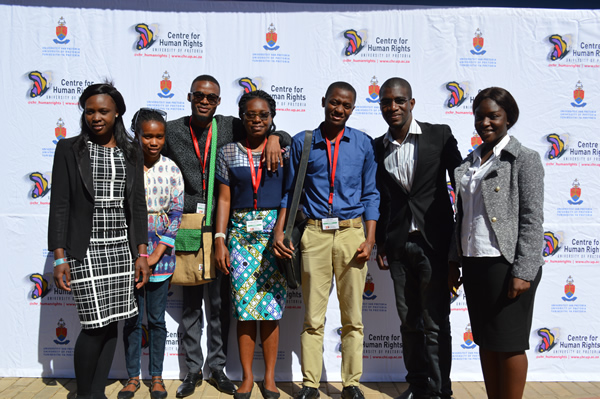To commemorate 30 years since the entry into force of the African Charter, 10 years since the African Court became operational and 30 years of the Centre for Human Rights, University of Pretoria; a special conference was held on Friday 7 October 2016 as part of the African Human Rights Moot Court competition.
The conference coincides with the 25th anniversary of the Moot Competition organised by the Centre for Human Rights, University of Pretoria in partnership with the University of The Gambia. The theme of this year’s conference is ‘The African Human Rights System @ 30: Taking stock, moving forward’.
![]() Download the conference programme
Download the conference programme
The conference was divided into five sessions and conducted in English, French and Portuguese. The first session commenced with opening remarks by the Director of the Centre for Human Rights, Prof Frans Viljoen. This was followed by presentations on the ‘Reflections on the work of the African Commission on Human and Peoples’ Rights’ by Prof Barney Pityana (former member of the African Commission on Human and Peoples’ Rights), AdvTom Nyanduga, (chairperson, Commission for Human Rights and Good Governance, Tanzania and former member of the African Commission on Human and Peoples’ Rights)and Hon. Mumba Malila (Judge of the Supreme Court of Zambia and former member of the African Commission on Human and Peoples’ Rights).
Professor Michelo Hansungule chairedthe second session on ‘Reconciling women’s rights and culture’ and moderated presentations by Pachalo Nomsa Mwenelupembe from Malawi, Hilda Tizeba and Simon Ngalomba from the University of Dar es Salaam, Tanzania, Paul Harpur from the University of Queensland and Olanike Adeakun-Odewale from the University of Pretoria.
The third session was on ‘Interpreting the African Charter and Maputo Protocol’. This session was chaired by Prof Magnus Killander. The session had presentation by Abdi Jibril Ali from Addis Ababa University who critiqued the rewriting of the African Charter on Human and Peoples’ Right based on the International Covenant on Economic, Social and Cultural Rights. Paul Ogendi from the University of Pretoria gave a reflective speech on the right to dignified life and Economic, Social and Cultural Rights adjudication under the African Commission’s General Comment No 3. This was followed by a presentation by Robert Doya Nanima from the University of the Western Cape. In his speech, Nanima evaluated the need for reform of the trends in the jurisprudence of the African Commission regarding evidence obtained through human rights violations. The final presenter, Ashwanee Budoo from the Centre for Human Rights, University of Pretoria concluded the session with a persuasive speech on the creation of a human rights institution at the African Union level to oversee the implementation of the Maputo Protocol.
The theme of the fourth session was the ‘Impact of the African human rights system’. This session was chaired by Victor Ayeni. Presenters under this session were; Japhet Biegon from Amnesty International Kenya, Emerson Lopes, legal practitioner from Maputo Mozambique, Camile Cortez, an attorney at Brazil and Lauren Nel Attorney, Johannesburg and Abdou Khadre Diop from Universite de Bordeaux.
The final session ‘Conflict resolution and accountability’ was chaired by Adv Bahame Tom Nyanduga. Here, presentations were made by Ndubisi Christian Ani (Institute for Security Studies, Addis Ababa, Ethiopia) on the implications of the immunity clause for senior government officials on conflict resolution in Africa, Jane Patricia Bako (Ugandan Christian University) on the role of Africa in ensuring peace in South Sudan and Didier Michel (University of Mauritius) on the analysis of Article 22 of the African Charter in the Mauritian context.
The conference ended with concluding remarks by Prof Frans Viljoen (Director, Centre for Human Rights, University of Pretoria) and HonourableMumba Malila (Judge of the Supreme Court of Zambia and former member of the African Commission on Human and Peoples’ Rights). Hon Mumba in his speech described Africa’s walk to human right as long and arduous and commended the Centre for its efforts in enhancing human rights globally.


